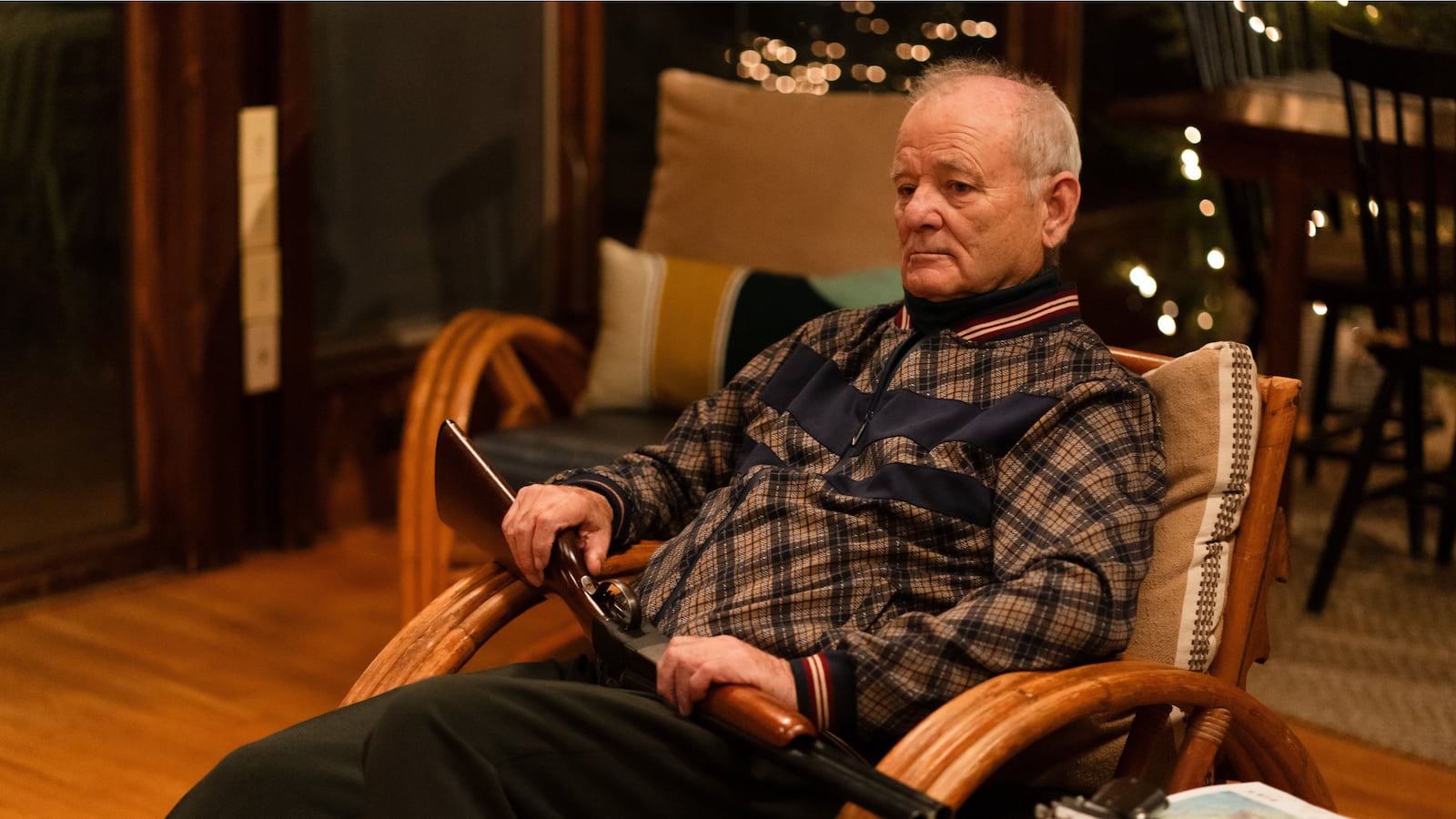Early on in Riff Raff, the alcoholic ex-wife of a retired gangster begs her son for a drink. He doesn’t have any booze on him (they’re walking through the woods first thing in the morning, for context), but he pulls a joint out of his pocket and offers it to her. She protests that she doesn’t want to get high alone. “Yeah, Ma, I’ll smoke with you,” he says, and puts his arm around her shoulder. It’s pathetic, but also kind of sweet.
This scene comes shortly after Ruth (Jennifer Coolidge) “jokes” about the time she woke up in Providence, Rhode Island, with a “burning asshole” and no memory of the previous night. “It felt like I had sat on a Coke bottle,” she says, in that distinctive whine that motivates people to hire Jennifer Coolidge. That is indeed an anal-rape joke, although it’s mostly just pitiful. That’s typical for this consistently misjudged film, which is too sad to be funny and too funny to be sad.
The film, now in theaters, is a work that successfully combines these tones is known as a “dramedy,” and plenty of filmmakers can pull it off. Not so much Dito Montiel, who directed a pretty good movie based on his memoir A Guide to Recognizing Your Saints in 2006. The further from his own experience Montiel gets, however, the more confused his films become. And Riff Raff moves away from his usual New York turf into Masshole territory, a shift that may seem subtle to outsiders but could get your a-- kicked if you confuse them in real life. It proves fatal here, too, adding a cartoonish layer to a movie where it’s already difficult to connect.
The characters are still scumbag street-level criminal types—except for Vincent (Ed Harris), who made enough money in (what else?) the hit-man business to buy several pieces of property out in the woods. He’s since retired, and started over as a man of leisure with his independently wealthy wife Sandy (Gabrielle Union) and her son DJ (Miles J. Harvey). Both are spectacularly miscast—Harvey’s role is what might happen if you plopped the kid from Jerry Maguire into the middle of Reservoir Dogs and just let him yap—and Harvey’s chipper voice-over feels like it was accidentally pasted onto the wrong timeline by an exhausted editor pulling an all-nighter.

And sure, there’s supposed to be friction between Vincent’s new family and his old one—namely Ruth, her son Rocco (Lewis Pullman), and his pregnant Italian (Italian-Italian, not East Coast Italian) girlfriend Marina (Emanuela Postacchini). They’re different in nearly every way, and Vincent’s attempt to cast aside his working-class kin has created resentment that will not be easy to resolve. Not to mention that Sandy doesn’t know her husband nearly as well as she thinks she does, an epiphany that will reveal itself through shocking acts of violence.
Yes, of course this is all building to gunplay—the tough-guy banter and Kris Kristofferson needle drop didn’t tip you off? It’s been a while since Pulp Fiction, but Riff Raff is still a descendant of Tarantino, once removed through Montiel’s own brand of criminal wit. There are small touches of tongue-in-cheek humor throughout the film—a document repeatedly referred to as “a highly detailed topographical map” is literally labeled “highly detailed topographical map”—but these are more stated than felt. Again, something is off here, and what should spark flames out every time.

A big part of why Riff Raff doesn’t click is the cast, full of big names who all appear hungover or exhausted or just not very engaged with their work. Bill Murray and Pete Davidson have subzero chemistry as hit men who pursue Rocco, Marina, and Ruth to Vincent’s cabin, halfheartedly arguing about beef jerky and indifferently splattering small-town store clerks’ brains against the walls of various charming fruit stands. (Riff Raff takes place in Maine but was shot in New Jersey, which sounds about right.) There’s a running bit about ziti. It’s whatever.
The film does come alive in the brief moments before and immediately after shots are fired, but there isn’t enough carnage to keep Riff Raff from flatlining. The pieces are too disparate, and fit too awkwardly together; the script might have been lively, but the performances don’t have any of that energy. On paper, the combination of elements at play here probably seemed exciting. In practice, however, it’s more like a box of wet matches.








